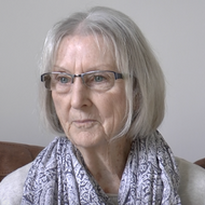Gill

Gill was invited to join a women’s health cohort study after taking part in a short study about ovarian cancer. Her participation involves answering questionnaires. Her motivation for taking part is to benefit other people.
Gill is married and has three children. She is a retired couple psychotherapist. Her ethnic background White English.
More about me...
Gill participated in a short study about ovarian cancer and, when that finished, she was invited to participate in a cohort study looking at women and the risk of breast cancer related to the use of menopausal hormone therapy. As she was invited to join the study several decades ago, she does not remember much about what she was told. However, she does remember participating in the study via a postal questionnaire which she gets every couple of years. The questionnaire asks different questions each time and she often wonders why particular questions are being asked. For example, when she was asked about her mental health, she wondered if they were looking for connections between experiences of mental health and marital status or religious belief.
Gill remembers feeling a sense of community between participants in the ovarian cancer study. She remembers there being a sense of comradery amongst the women all waiting to be called in to give samples. In contrast, because her participation in the cohort study is through a questionnaire, she has not been able to connect with other participants. While she misses feeling like she was a part of a community, she does not feel it is particularly important to the study.
Gill’s motivation for continuing to participate in the cohort study she describes as “philanthropic”. She feels that she is giving back to the community through her participation and that she does not need anything in return. However, Gill would find it interesting to know how the data is being used and would like to read any research papers that are published from the study. Gill does not have any contact with the research team, but she thinks that the questionnaires also include information about who to contact if she wanted to withdraw.
Gill encourages others to take part in cohort studies if they are invited to take part. She thinks that participating in this sort of research is really interesting and worthwhile. She feels that it is not a difficult thing to do and that it does not take much time. Gill’s message to researchers running cohort studies is that “I hope it goes well”.
Interview conducted in 2019.
Gill says it takes about 30 minutes to complete the annual questionnaires for her study and then she posts it back to the researchers.
Gill says it takes about 30 minutes to complete the annual questionnaires for her study and then she posts it back to the researchers.
And were there any downsides?
I don’t think so, really. It’s, it wasn’t a difficult form to fill in and I was happy to take the time.
Okay and does it ever feel like a burden when you get that through the post? Do you sort of think, ‘Oh I’ve got to do this again and it’s another thing?’
No, I don’t, I feel, ‘Oh this is interesting. I wonder what questions they’ll be asking this year?’ because they’re often different.
I think I’d say, “Go for it”. I mean it’s a, it’s not a difficult thing to do. It takes about, I suppose, half an hour or a bit longer to fill out the questionnaire and, and you just send it back. I mean, you know, it’s not hugely onerous from the point of view of time or effort, so I’d say go for it.
Gill doesn’t mind that she won’t personally benefit from the research she contributes to, and says “it’s a philanthropic thing”.
Gill doesn’t mind that she won’t personally benefit from the research she contributes to, and says “it’s a philanthropic thing”.
I think I’d say, “Go for it”. I mean it’s, it’s a, it’s not a difficult thing to do. It takes about, I suppose, half an hour or a bit longer to fill out the questionnaire and you just send it back. I mean, you know, it’s not hugely onerous from the point of view of time or effort, so I’d say go for it.
Even though they might not get any positive benefits that they can see?
Yes, yes well, it’s a philanthropic thing, isn’t it?

